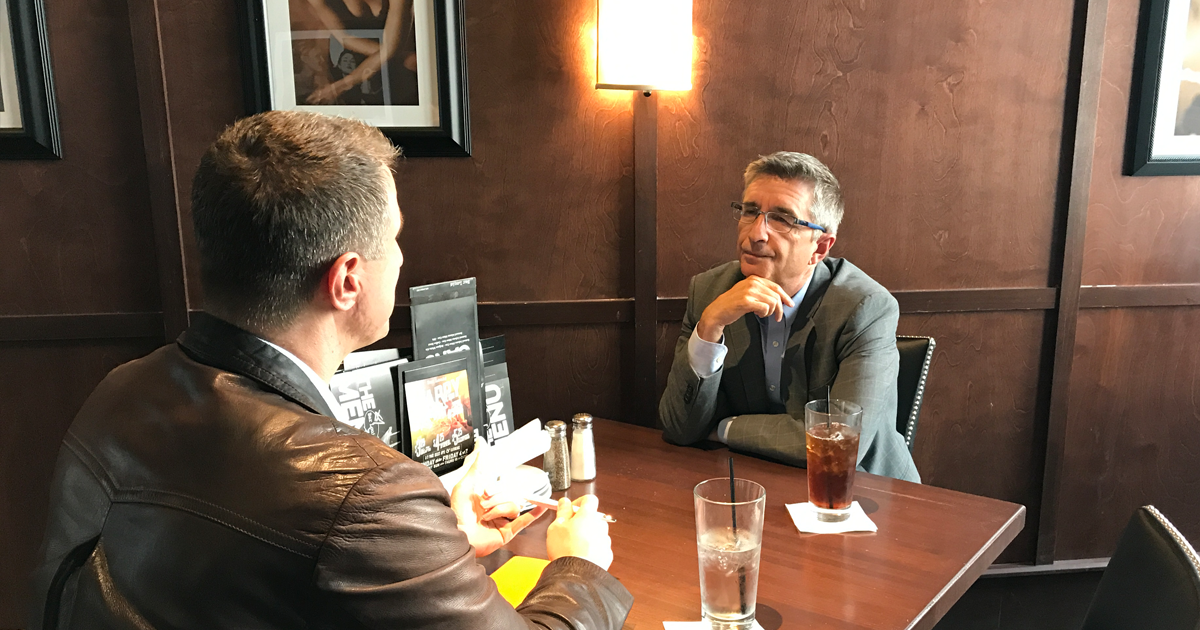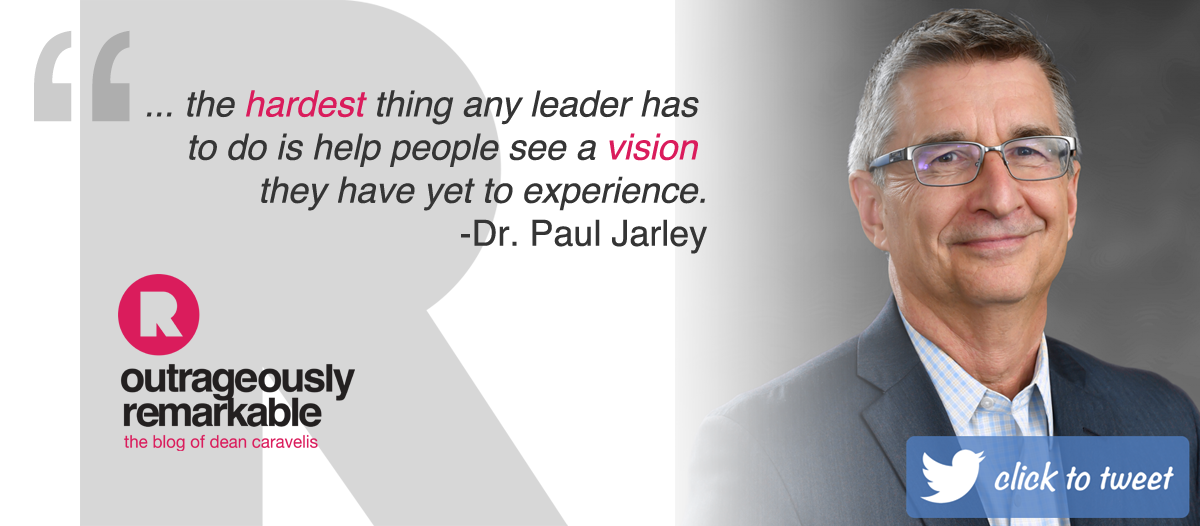Paul Jarley
September 16, 2017
Education. Bring up this subject with anyone and it’ll be a hot button of sorts. On my blog I’ve interviewed people who represent unorthodox educational paths, including many of my friends at the altMBA program. While I’m an alum of that program, I also have an MBA from the UCF College of Business and there happens to be an interesting figure who runs the building. I thought that he would give us great insights into ‘traditional’ education … but you’re about to find out why UCF’s business school is anything but traditional.
In baseball, you must swing at the ball if you want to hit a home run. No one has hit one by watching pitches go by or attempting a bunt. Dr. Paul Jarley, Dean of the University of Central Florida (UCF) College of Business, would know this best for two reasons. The first hint is when you walk into his office … The National Baseball Hall of Fame in Cooperstown would be jealous of the memorabilia. He wears his love for the sport on his sleeve and on his desk and on his shelves and on his cardboard cut-out (more on that later). Secondly, since he joined UCF in 2012 he has been swinging for the fences to create a cutting-edge culture for the business school & deliver linchpins into the workforce.
Before we get any further I wanted to let you know that Paul knows you are either going to love him or hate him. Nothing in the middle. He’s fine with that. You just can’t ever accuse him of bunting though, because he doesn’t.
As part of Paul’s mission at UCF, the nation’s 2nd largest university, he has established at the College of Business: a student ambassador group program, a corporate partnership program and The EXCHANGE, a Ted Talks style event space that hosts industry and business pioneers, thought leaders, faculty, executives and entrepreneurs in daily discussions with students. Full disclosure, I’m an alumnus of the business school and I’m pretty jealous that I didn’t get to learn in this type of setting as a student. The silver lining? I’ve been heavily involved as a volunteer and have seen firsthand the powerful interactions that his vision has created.
You’re probably starting to see a pattern with Paul: engagement. Whether he is introducing speakers such as Seth Godin, George Anders or Robert Stephens to drop knowledge on a few thousand students at once, or encouraging a 1-on-1 conversation between a student & a professional at an event, engagement is one of the key drivers in Paul’s culture. This is in-line with UCF’s slogan: America’s Partnership University. Partnerships are ALL about engagement.
Now, Dean Jarley is very in-demand. So busy that his team has created a life-sized cardboard cut-out of him called ‘Flat Dean’ that they bring to events he is unable to attend. Fortunately, I was able to dodge Flat Dean and get the real deal to meet me for lunch …
[Setting: I pulled up to meet Paul at a restaurant located in east Orlando, Florida, across the street from UCF’s main campus. The eatery is part of a massive complex that includes apartments, restaurants & bars. It is part of the new amenities created to quench the demand of the growing student population at UCF. As I walked up to lunch it occurred to me that this huge development used to be a parking lot, and 20 years ago I used to ride my skateboard across it to buy fast food. As I walked in, I saw Paul at the host stand. We chatted for a few & then grabbed a table toward the back … ]
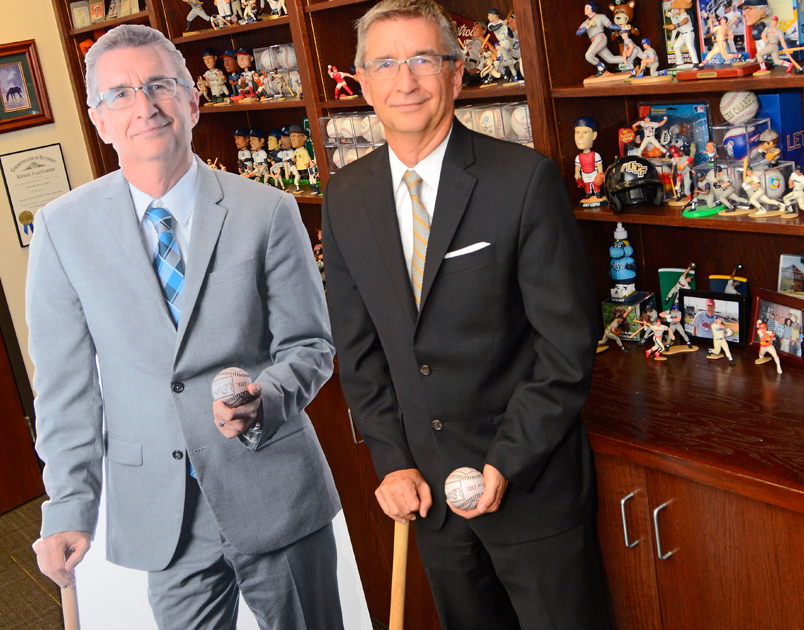
Dean: Who is the most remarkable person that you know and why? Is there someone that comes to mind when I say that?
Paul: So yes and you know her. Tiffany Hughes [my Executive Director of Outreach & Engagement in the business school]. The reason that I would pick Tiffany Hughes is that when you first meet Tiff, you think, “Really?” You’re laughing because you know where I’m going with this. But by the third time you meet her, you go, “No, really!” I don’t think I’ve ever met someone who is as devoted and committed as Tiff is. Someone who wakes up with a positive state of mind every morning and does whatever she can for as many people as she can, for as long as she can … and then she sleeps an hour and she does it over again. It’s impressive. I tease Tiff sometimes that she’s going to wake up one day and be 80. [laughs] And she’ll still be doing it because she’s so driven by it and nothing stops her. Not one ounce of it is about her. Not one ounce. And I think again when you first meet her, that seems so over the top that you don’t appreciate it. But yeah, I would pick Tiffany.
Dean: She’s like the energizer bunny meets …
Paul: You can’t describe it, you have to encounter it! But you know exactly what I mean.
Dean: She definitely lights up the room and she’s also somebody that you miss.
Paul: You know, to drive that point home, I think it was three years ago at the [UCF College of Business] Hall of Fame event, she came up to me the next morning during the golf tournament and said, “I have bad news for you. My husband just took a job in Chicago and I’m moving.” I said, “I don’t care if you’re moving or not, I’m not losing you.” So the joke around the College now is that if I want to know what’s going on in the building, I call Chicago.
Dean: So at UCF College of Business, you obviously encounter a lot of students, a lot of faculty, a lot of external partners … we talked a little bit about this earlier, but as far as careers go, what is one tip for my readers on how they can stand out in their careers?
… I hold a Failure Competition every semester …
Paul: Can I give you two answers here? I’ve thought a little bit about this. The first thing, and I think Tiffany is a really great example of this … your career should be about a cause or an idea, not about you. I think people who make their career about them tend to be disappointed and they tend to disappoint others. I think that you need to understand what drives you, whether it be a value or an idea or a cause, and you need to devote your time and energy to that and making that better. You will be successful as a consequence of that. The other thing, and this won’t surprise you when I say it, is to anticipate some failure. One of the things that I do in the College is that I hold a Failure Competition every semester and the Failure Competition actually came from an interview that I saw on Mike & Mike in the morning. Mike Greenberg, who is a terrific interviewer, was interviewing Gary Player and he asked Gary Player about the mind of a champion. And Player said this, “I would get up every morning and I would look myself in the mirror and I would say, you’re going to make some bad shots today. You’re going to make some bad shots when Tiger Woods is on the 18th hole and he’s sinking a birdie and everybody’s cheering.” He said, “You know why I did that? I did that because when the bad shots happened, they were no big deal. I expected bad shots. My recovery from that was a lot better.” And I thought … genius. So, I’ve made it a point in my career and in the College of driving home that point. Anticipating, which is different than accepting or expecting, but anticipating that things aren’t going to go according to plan is a very helpful thing. It helps you think about how to mitigate those risks, whatever they might be. I think it makes it much easier to be more resilient in recovering from them. Most people go into projects believing that everything is going to go smoothly and it never does. When I have people in my office telling me that the sky is falling for one reason or another, I just look at them and I say, “Of course there were going to be problems. You’re not telling me anything I didn’t already expect. So, let’s get over that and let’s figure out how it is that we’re going to overcome whatever that setback or obstacle is because we believe in what we’re doing.”
Dean: It’s never as bad as it seems.
Paul: Never, ever as bad.
Dean: It’s also never as good as it seems.
Paul: [laughs]

Dean: Going back to the first point, what is the cause or idea that drives you?
Paul: So, I want to change how people experience their education. Probably what’s most controversial about what I try to do is that I don’t believe that the College of Business is a place or a building. I think it’s a culture and a set of experiences that are designed to help people develop the mindset that they need to succeed. I am driven by trying to create that kind of experience and culture that will lead to those kinds of outcomes. I think honestly, this is a lesson in what you’re doing right now, and I say this all the time. Plato essentially got this right: The best education occurs when you get to sit on a log next to somebody who has something interesting to say. The more we can create an environment in which that is true, the better off we’re going to be. The more we can get people out of their comfort zones, to challenge them, to stretch themselves through new experiences, the more we’re going to help them develop the mindset to succeed. The Failure Competition would be a really good example of that. It’s not a celebration of failure, it’s a celebration of perseverance and learning from it.
Dean: In all of these things you are mentioning, I’m just seeing everything tying into fighting the status quo at the College of Business, but what does the status quo represent to you?
Paul: Oh, the status quo is your comfort zone. That’s how it became your status quo.
Dean: What’s your biggest status quo fear about the College?
Paul: It’s always this I think; people fear change. Any change process that you go through has to recognize that people fear change. It has to have a strategy that helps them understand that doing nothing is actually riskier than doing something and then provides them with a vision going forward where they see that they have a role in that vision. I think the hardest thing any leader has to do is help people see a vision they have yet to experience. Really hard. And so developing milestones, helping them to see that along the way, recognizing when people are uncomfortable and helping them overcome that discomfort … all important.
Dean: Obviously, with UCF, the first thing that comes to mind is “big,” but what would you say is the most remarkable thing about UCF, and maybe the College of Business in particular, that you didn’t know or you were surprised by when you arrived here?
Welcome to UCF! [laughs] Anybody else would think that’s insane.
Paul: Honestly, I think it took me a year to figure this out, but because of our size and because of our resources relative to our size, we can’t do things by traditional means … we’ll break that. It forces us, and I think that is the right term, it forces us to think unconventionally. Think about the madness in me saying (quoting Plato, essentially) when I have 8,500 students and 120 faculty, how am I going to do that? You’ve been there, but The EXCHANGE is one of the ways that we implement that. My goal was to have 120 students every day having a conversation with somebody from the outside about something important to the future. I was worried about whether I could achieve that goal. We averaged three and a half a day. In the first year of the existence of The EXCHANGE, we did 210 sessions with 17,000 students. Welcome to UCF! [laughs] Anybody else would think that’s insane.
Dean: You’re probably right! I’ve spoken there a handful of times now. It’s a great platform for students who want to connect with professionals. I think an important point is also the consistency with which it happens.
Paul: It’s a daily part of life at the College. I’d love for you to come back sometime and talk to the students about what you’re doing right here [on your blog] and why you’re doing it. I think that would be a really interesting conversation for them to have with you.
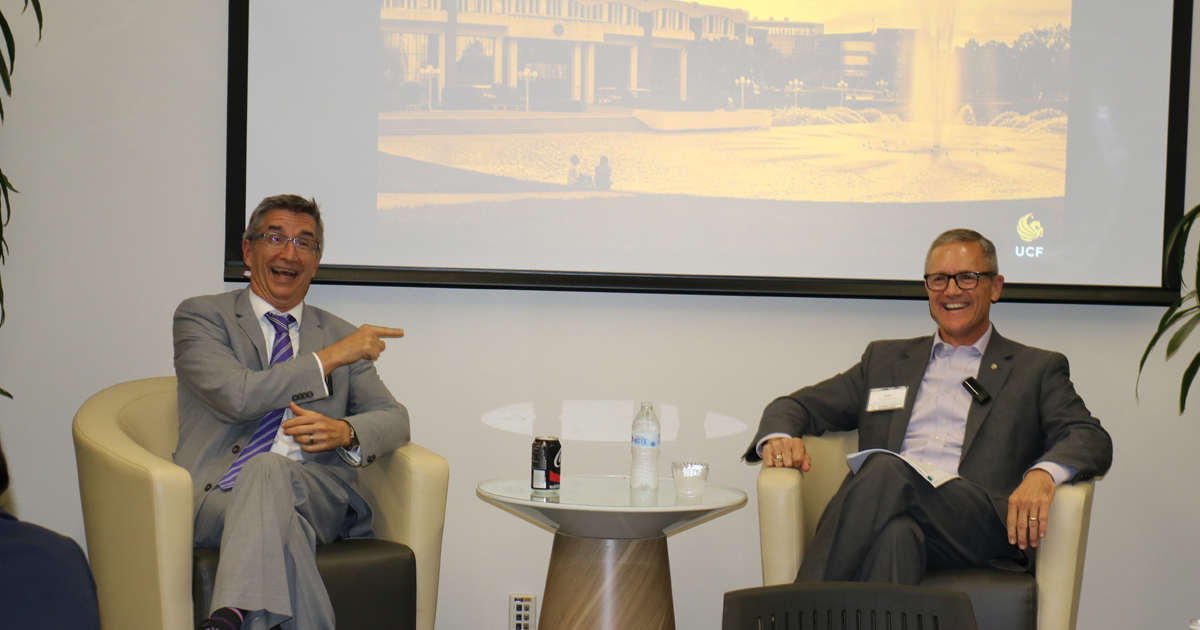
Dean: I would love to do that. That would be fun. I think this interview will probably be coming out around the late summer, early fall, so we’ll have more data points on that. You know, with the College of Business developing this culture of fighting the status quo and getting people out of their comfort zone takes a lot of motivation. We were talking earlier about how many ceremonial things you have to do throughout the days, weeks, months. What motivates you?
Frankly, the traditional model of higher education isn’t sustainable.
Paul: Legacy, in a word. I think maybe the older you get, the more you realize that time is short. The more you want to make sure that when you get to the end, that you can look back and say to yourself, this was time well spent. There’s a great Ted talk on this and it’s by an EMT. Just a regular guy, an EMT, talking about him getting to scenes and people knowing that they’re going to die. They know that he’s not going to be able to save them and what their last conversations are about. Honestly, he said it’s not about spending time with your family. It’s not about spending time on your job. It’s about wanting reassurance that you have spent your life wisely. I thought that was a really interesting insight. I think this is where I’d like to make a contribution. Education has always been important to me. I was a first-generation college student, I am who I am because of the educational experiences that I have had. I get to do that on a very large scale here. I have a very big canvas. Frankly, the traditional model of higher education isn’t sustainable. It’s just not. So we’re going to have to figure out how to do this differently and whether I figure it all out or make a contribution, honestly, that’s for somebody else to decide.
Dean: In talking about the future, Tim Urban had this Neuralink article that he wrote, and the crux of it was that all of the computer power in your laptop and beyond will eventually be able to be piped into your brain directly so that you have access to as much information whenever you want. When that happens, what does education look like?
Paul: I think that’s a great question because it allows me to uncover what I think is the fundamental misunderstanding about what’s going on. So let me start with this. Back in my day, you would go into a large lecture hall, maybe 500 students in it, and then you would break out into what were called recitation sections. Do you know why they were called recitation sections? Universities started in the Middle Ages and in the Middle Ages, this was before the printing press, and so books were expensive. So they had someone, and unfortunately, in those days it was a guy, stand up in front of the group and recite the book. Well, you don’t even need to get to that state of the world. If you need to know any piece of information today, what do you do? Well, you Google that. But, education isn’t about information sharing. It’s about meaning and perspective and mindsets. I’m not terribly worried about that computer downloading a point of view. Maybe A.I. will get there and the Terminator will turn out to be true … I don’t know how to win that future if that future comes. But, I would be surprised if it comes. I think a great deal of learning is social. I think very few people today would tell you that their greatest problem is that they don’t have access to information. Their greatest problem is that they don’t know what it means and how to make sense of it.

Dean: Based on what you’re saying, I wrote a couple of things down – “choice” and “interpretation.” I often talk about how mindset is a choice. At the end of the day, it is. And discerning between things, that’s an interpretation … your worldview … your understanding … a collective of your own experiences.
My job is to make sure all 8,500 students have an answer to that question.
Paul: One thing I will say to students is this. Walk up to any faculty member and ask them one question, “Whose student were you?” You will get a very, very specific answer to that question. They will identify a couple of faculty who really helped them think about problems, how they defined them, the methods they used, the worldview and perspective that they have, what they think are interesting things to work on, what they don’t think are interesting things to work on … My job is to make sure all 8,500 students have an answer to that question. If you don’t have an answer to that question, you got cheated.
Dean: If I were to ask you whose student were you, who comes to mind?
Paul: So, I was trained by a couple of gentlemen who were members of the War Labor Board back in WWII days. They later moved to the Department of Labor. I’m a labor economist by trade … particularly interested in trade unions and labor conflict, the development of industrial society. I would say that how they approached institutions, and how institutions affect behavior, and the changes that were going on in society, and how that manifested itself in the employment setting, were perspectives that I took from them. Quite frankly, I think they’ve helped me greatly in my job as Dean. Nowadays, I think about it this way. I like to end every day thinking that I was a student of somebody that day. I get paid, quite honestly, to go around and have interesting conversations with interesting people and to bring that back into the College in ways that help students learn. I look for that every day.
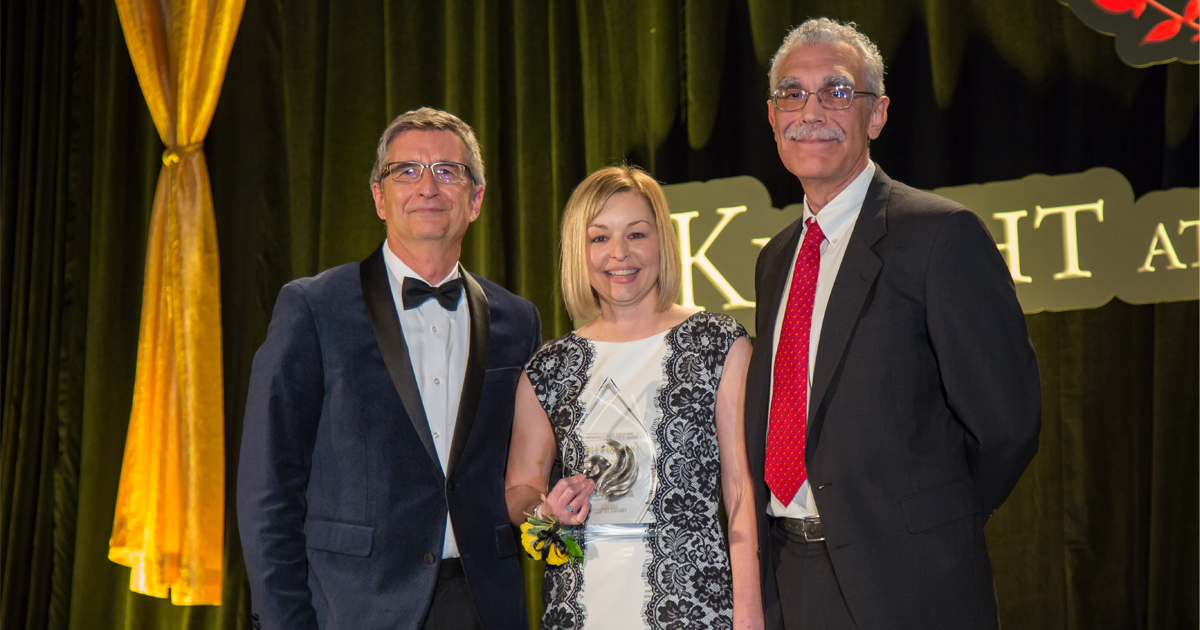
Dean: What’s one assertion about the future of education, maybe looking forward to the next 20 years, that you have that might surprise people?
When I was in graduate school, I taught economics in a maximum security prison.
Paul: I don’t know how surprising this is, but I don’t think I need a faculty member talking to students three hours a week for 15 weeks anymore. I took this to a group of faculty a couple of years ago and I said to them, “Suppose I told you that you had 50 students in a class, but I’m never going to let you meet as a group. We have adaptive learning now, they can learn through videos, we’re going to test them. How this math works is that they come in and they sit down with you three times for 20 minutes. What do you tell them?” Because when you query people about my question whose students are you, they’re not going to tell you about a faculty member that they sat in for 15 weeks that mesmerized them. They’re going to remember one or two conversations that they had with somebody. And maybe an experience associated with that. I need to free faculty from doing low-value things that you can either Google or find on YouTube so that they can have more higher impact exchanges with people. That’s how I kind of look at it.
Dean: Who is the most remarkable student that you’ve had throughout your career? Why have they stood out in your mind in such a way that they come to the top? And you have to pick one!
Paul: [laughing] When I was in graduate school, I taught economics in a maximum security prison. I don’t know who thought this was a good idea, but it was part of a program that was training inmates to be chefs when they got out of prison. For those of you who don’t know, in a federal prison system, you have to serve a minimum of seven years. At the time, that was minimum sentencing. And I had a young African American student who at a very early age, I think 14 or 15, robbed a bank … it’s not easy to get into federal prison. He was one of the best students that I have ever had. Ever. Remarkably bright, remarkably inquisitive, continued to be filled with hope despite the conditions he was in. If he could do that there, that was incredibly inspiring. And I’ve never forgotten him.
Dean: So, I’ve been asking my interviewees to put their humility aside for the last question because it’s the only way that you can speak freely, so I give you permission to put humility aside. What is your secret to being outrageously remarkable? And by the way, you are because I’m interviewing you.
Paul: My first reaction would be that’s something that’s bestowed upon you, so you don’t think about it. I guess if I had to answer that question, you can’t have a 15-minute conversation with me and not know what I’m about. And every time you engage with me, you’re going to get that.
I’m not shy about it, I’m not apologetic about it. I will defend that to the death.
Dean: A level of authenticity.
Paul: Right. It’s just like when you engage with Tiff, you’re going to get that same thing every time. Yeah, I think authenticity is a great way to describe that. I’m not shy about it, I’m not apologetic about it. I will defend that to the death. [laughs] Kind of how it works. The other thing I will say, and I think this is key as well … I would say this about most people who carry that moniker, no one is indifferent towards me; I won’t let them be. Right? You can be for me or against me, I don’t really care, but you will not be indifferent towards me. So, if you were to walk on campus and say, “Hey, that Dean Jarley guy, what do you think about him?” No one is going to go, “Eh.” That is not the response you’re going to get.
Dean: I appreciate the time and I want to let you get back to campus and continue making UCF College of Business remarkable.
Paul: Thank you, Dean.
_____
You can connect with Dr. Paul Jarley on Twitter & check out more about UCF & the UCF College of Business.
To receive exclusive nuggets & subscribe to be an insider & don’t miss out!.
